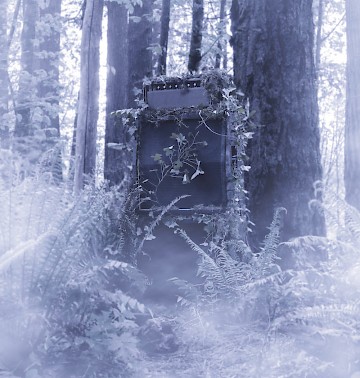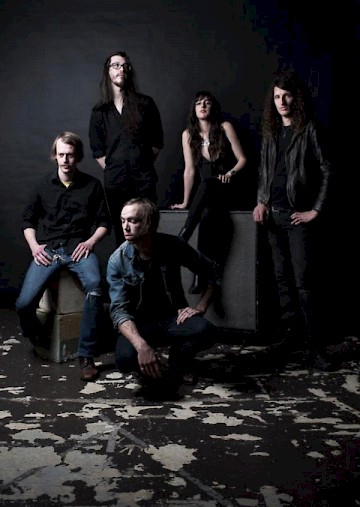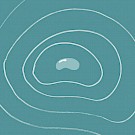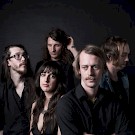 Sometimes a creative journey can become a physical one.
Sometimes a creative journey can become a physical one.
Benjamin Blake was traveling across the country playing acoustic music before he took root in Tucson, Ariz. It was there that the influences of the surrounding wilderness seeped into his songwriting, laying the foundation for his musical project, Young Hunter. With dissonant distortion, tribal effects, and picturesque lyrics, he managed to paint a backdrop of desert imagery for his cataclysmic songs about humanity’s search for meaning in the context of nature.
In the years since moving to Oregon, Young Hunter has soaked up influences from the Northwest’s aesthetic, along with the creative input of a new lineup of musicians Blake has befriended. With this fresh perspective, the band produced its latest, self-titled album.
On first listen, it’s easy to hear how Young Hunter is reborn on this new LP. The relentless elements and simultaneous beauty of the Northwest come to mind amidst a heavier onslaught of guitar rhythms, while layers of searing electric melodies and occasional whirlwinds of improvisation also breathe new energy into these songs.
Blake and Sara Pinnell’s soft yet dark lyrics also recall images of mountainous forests and trickling rain between narratives of war and other human conflict. While Young Hunter is filled with heavy, electric guitar work and psych-inspired grooves, songs often flow seamlessly into softer moments that highlight these tranquil vocal harmonies and emotional lyrics. Some impressive instrumentation comes in these softer instants as well, revealing the band’s dynamic songwriting abilities.
 The artwork for Young Hunter's self-titled LPYoung Hunter is available for preorder via Bandcamp and will be released March 20 on vinyl, CD and digital download. You’ll also be able to grab a copy when the band kicks off a West Coast tour with their record release show on Saturday, March 26 at Black Water Bar with Cambrian Explosion and Mammoth Salmon.
The artwork for Young Hunter's self-titled LPYoung Hunter is available for preorder via Bandcamp and will be released March 20 on vinyl, CD and digital download. You’ll also be able to grab a copy when the band kicks off a West Coast tour with their record release show on Saturday, March 26 at Black Water Bar with Cambrian Explosion and Mammoth Salmon.
You’ve been here for a few years. Between moving to Portland and finding new folks to play with, how has that affected what you’ve put together for this new record?
Benjamin Blake: There’s a few different elements to that. One is with the people I’ve been playing with now—as I’ve started the band again from scratch—we’ve started a different process. So when I was doing the band in Tucson, it was seven people: two drummers and three guitar players. I would write the songs by recording them and then layer all these different parts. We wound up needing seven people to make these recordings happen live. So when I moved up here, I wanted to start it in a more simple way with not as many people. I wanted each musician to have a voice in the band rather than just playing these parts that I had written. So it’s been more collaborative for one thing.
Also, in ways that have been harder for me to put my finger on, the desert was a really big part of my writing when I was working in Tucson, and the environment here I resonate with deeply too. But it doesn’t have quite as many sonic tropes to pull upon like using a Telecaster [guitar] or a shaker. It’s not as easy to invoke the forest. But I do think that being here rather than there has influenced the sound and what is being talked about in the music.
You definitely had a desert vibe going and that kind of cataclysmic darkness in your lyrics. Do you think that your lyrics are similar for this new album too?
I think in essence it’s dealing with the same subject matter. To me, Young Hunter has always been about exploring humans’ relationship with the earth. That means the many layers of civilization that have happened before us, and the individual in relation to nature, and human civilization in relationship to the earth. That hasn’t changed yet.
You said you were mainly playing acoustic music for a while. How did you start to add a more electric and heavy element to your music?
I got an electric guitar. I was playing folk music for a very long time. Lyrics are really important to me, and through my early 20s, that was all I really cared about—the great songwriters. Heavy music—since I was an early teenager—has been a part of my life, but it was kind of on the back burner for a while, as I was like, “Lyrics are the only things that matter. What is a person saying in their music.” I still do that, but I reached the limit for myself of wanting to impose that on the world. I want to have more fun with music and make music that’s more expressive of what I’m actually talking about.
I worked on a weed farm for a while, and with that money, I got an electric guitar and an amp, and as soon as I got that, I started writing heavy music again.
Yeah, it’s really cool that you blend singer-songwriter elements with heavier rock and roll, and that you’ve got these long songs that descend into lighter moments and then erupt into heavier ones.
 Photo by Mike GrippiYeah, heaviness is such a wonderful tool to really explore the feelings of being alive today. Life is so fucking intense right now on this planet, that [heaviness] just feels like it can express those feelings better than an acoustic guitar.
Photo by Mike GrippiYeah, heaviness is such a wonderful tool to really explore the feelings of being alive today. Life is so fucking intense right now on this planet, that [heaviness] just feels like it can express those feelings better than an acoustic guitar.
Do you have any strains or types of bud you enjoy?
I don’t really smoke weed. I did for a long time, but it’s been a long time since I have. I’ve worked with it a lot. It definitely influenced my life for a long time, and it changed the way I hear music in a way that’s still with me. But I guess it just stopped being helpful for me at a certain point.
There is one thing I want to say about weed that I think is interesting. I think that the West Coast economy for it has provided more funding for the arts than anything else. I know so many people who have been trimmigrants and then have put out an album, or were able to buy their [music] gear. I think that’s really amazing, that it’s helped fuel creativity and helped make things happen for people that otherwise wouldn’t have been available to be starving artists.
How were you able to find new people to work with on this record when you moved to Portland?
It started with a friend from Tucson who moved up here before me. He met our drummer at a bar. And then Sara, who sings in the band, we became friends through Craigslist. And then our other guitar player, Erik [Wells], was friends with her.
I got so lucky. They’re all incredible musicians. And when I moved here, I had this intention of not writing everything myself and that was really hard for me to let go of that control, but I was just instantly surrounded by people who totally got where I was coming from, and who have really awesome ideas, and who are totally supportive of the vision of Young Hunter.
Do you think that was the case with the single “Nothing Shakes the Void” that you recently put out—that you guys were more collaborative on it?
I think it definitely was. A lot of it was that we spent a lot of time working out what feels right. When I was writing songs by myself, I’d spend a few days working on a song, and then it would be done, and the band would learn it.
Now we spend months on a song. And we’ll just try things from a bunch of different angles. We’ll play around with something until everything flows right and sits correctly. It’s this big complicated sculpture. You have to find ways to support different parts and lead into different parts. So that song [“Nothing Shakes the Void”], if I had to come up with that song in a day, I wouldn’t be able to. It’s just too much information; you need to spread it over a longer course of time.
Anything else you’d like to add about this upcoming album?
This album has been an epic journey. I’ve been working on it for a year. Just the recording of it started a year ago. I think, if anything, I appreciate anyone taking the time to listen to it because we’ve condensed so much work and thought into one small 45-minute package. I appreciate anyone that takes the time to engage with that.





